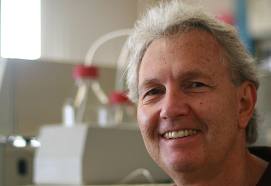
“Lipin/Phosphatidic Acid Phosphatase in Lipid Metabolism and Cell Physiology,” will be presented 4 p.m. Oct. 10 by George Carman, Rutgers University. A reception will be held at 3:30 p.m. The event is at Beadle Center and is open to the public.
Phosphatidate phosphatase catalyzes the dephosphorylation of PA to produce diacylglycerol and Pi. The DAG produced in the reaction is used for the synthesis of triacylglycerol and for the synthesis of phosphatidylethanolamine and phosphatidylcholine via the Kennedy pathway. The discovery that PAH1 encodes PA phosphatase in yeast led to the revelation that the mouse fat-regulating protein named lipin is a PA phosphatase enzyme.
The location and catalytic efficiency of the yeast enzyme are governed by multiple phosphorylations/dephosphorylations, whereas enzyme expression is governed by transcriptional and posttranscriptional mechanisms. Yeast pah1 mutants have increased levels of PA and palmitoleic acid in membrane phospholipids, and reduced levels of DAG and TAG.
The TAG deficiency renders pah1 mutants exceptionally sensitive to fatty acid (e.g., palmitoleic acid)-induced toxicity. The elevated PA content in pah1 mutants causes the induction of phospholipid synthesis gene expression and the aberrant expansion of the nuclear/ER membrane. The pah1 mutant also exhibits a respiratory deficiency phenotype, a decreased life span, and sensitivity to growth at elevated temperature.
The complete schedule of seminars may be found at http://biotech.unl.edu/
More details at: http://go.unl.edu/4pb